#Tendency for Interpersonal Victimhood
Text
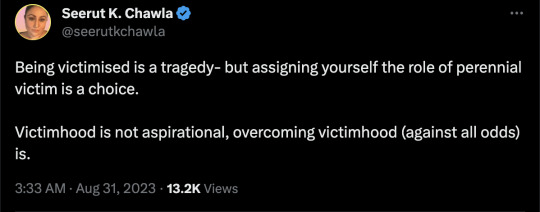

"When victimhood is currency, expect counterfeiters."
#Seerut Chawla#victimhood culture#victimhood#social currency#eternal victim#Tendency for Interpersonal Victimhood#religion is a mental illness
42 notes
·
View notes
Text
This was a study done on Israeli Jews, weaponized victimhood, and the psychological aspects thereof. Please read the whole article, but notable selections include:
Moral elitism often develops as a defense mechanism against deeply painful emotions and as a way to maintain a positive self-image. As a result, those under distress tend to deny their own aggressiveness and destructive impulses and project them onto others. The “other” is perceived as threatening whereas the self is perceived as persecuted, vulnerable and morally superior.
General background:
A group that is completely preoccupied with its own suffering can develop what psychologists refer to as an “egoism of victimhood,” whereby members are unable to see things from the perspective of the rival group’s perspective, are unable or unwilling to empathize with the suffering of the rival group, and are unwilling to accept any responsibility for harm inflicted by their own group (see here and here).
At the group level of analysis, victimized groups tend to frequently ruminate over their traumatic events. For instance, the widespread existence of Holocaust material in Jewish Israeli school curricula, cultural products and political discourse has increased over the years. Although modern-day Jewish Israelis are generally not direct victims of the Holocaust, Israelis are increasingly preoccupied with the Holocaust, dwelling on it and fearing that it could happen again.
Very real consequences as seen in the study (most language verbatim from the study):
Interpretation bias: "The researchers found that people with a higher tendency of interpersonal victimhood perceived both low-severity offenses (e.g., lack of help) and high-severity offenses (e.g., offensive statement regarding their integrity and personality) as more severe."
Attribution of hurtful behaviors: "People with a tendency for interpersonal victimhood may experience offenses more intensely because they attribute more malicious intent to the offender than those who score lower in a tendency for interpersonal victimhood...This bias has been found to exist at the collective level as well. Social psychologist Noa Schori-Eyal and colleagues found that those who scored higher on a “Perpetual In-group Victimhood Orientation” scale—measuring the belief that one’s in-group is constantly being victimized and persecuted by different enemies and in different time periods—had a greater tendency to categorize out-groups as hostile to the ingroup and responded faster to such categorization (suggesting it was more automatic). High scorers on this scale were also more likely to attribute malevolent intentions to out-group members in ambiguous situations; and when primed with reminders of historical group trauma, they were more likely to attribute malevolent intentions to the out-group."
Memory Bias: "Those with a greater tendency for interpersonal victimhood also had a greater negative memory bias, recalling more words representing offensive behaviors and feelings of hurt (e.g., “betrayal,” “anger,” “disappointment”), and recalling negative emotions more easily...At the group level, groups are likely to endorse and remember events that affected them the most emotionally, including events in which the ingroup was victimized by another group."
Forgiveness: "The researchers also found that people with a high tendency for interpersonal victimhood were less willing to forgive others after an offense, expressed an increased desire for revenge rather than mere avoidance, and actually were more likely to behave in a revengeful manner. The researchers argue that one possible explanation for the low avoidant tendencies may be the higher need for recognition among those scoring high in a tendency for interpersonal victimhood. Importantly, this effect was mediated by perspective taking, which was negatively correlated with the tendency for interpersonal victimhood."
(All emphasis mine)
So perceiving oneself and one's own group as perpetual victims makes one more reactive, more prejudiced, and less forgiving. Sometimes psychology feels like "water is wet" but it's interesting to see a phenomenon like this tested rigorously.
This study did not look specifically at Zionism, but as someone who has been a part of many different American Jewish communities, this victim mindset is just as much a part of their own political and/or religious Zionism.
The author's concluding thoughts, which I agree with:
"But there’s the thing: If socialization processes can instill in individuals a victimhood mindset, then surely the very same processes can instill in people a personal growth mindset. What if we all learned at a young age that our traumas don’t have to define us? That it’s possible to have experienced a trauma and for victimhood to not form the core of our identity? That it’s even possible to grow from trauma, to become a better person, to use the experiences we’ve had in our lives toward working to instill hope and possibility to others who were in a similar situation? What if we all learned that it’s possible to have healthy pride for an in-group without having out-group hate? That if you expect kindness from others, it pays to be kind yourself? That no one is entitled to anything, but we all are worthy of being treated as human?"
[NB: I think anyone who's been on Jumblr or a Tovia Singer livestream for more than 5 minutes can see how important these final questions are to healthy/unhealthy Jewish identity.]
As a convert, I can confirm that this is true. I was not raised with this Jewish-victimhood-centric zionist worldview. It was something I was taught as an adult, and it was stuck in my mind just as much as it is stuck in the minds of Jews who were raised as zionists from birth. But I learned better, as can anyone else.
I've seen someone who internalized the Jewish-centric/anti-Christian worldview without even becoming Jewish because that's how pervasive this Jewish-supremacist worldview is. And that person is unlearning this mindset. All it takes is asking a few questions.
Zionism and its accompanying fragile victim mentality can be unlearned. It took less than a month for me. You have to be willing to introspect, and a lot of Zionists are absolutely not willing to do that right now. But it can be done.
This article doesn't touch on Zionism directly, but one thing I want to drive home if you've read this far is that it is a very, very fragile worldview that needs constant propping up. That's why so many young Jews are leaving Zionism.
If that's you: https://decolonizepalestine.com/ (or reach out to me--anon and DMs are always on)
All it takes is a few questions, and the entire house of cards comes tumbling down.
I do ask that anyone who wants to respond publicly read the whole article first.
34 notes
·
View notes
Link
#narcissism#playing the victim#VICTIM MEnTALITY#identity#arrogance#self righteousness#resilience#anxiety#self reliance#the brain#nuance
0 notes
Text
My Elbert: Neurodiversity & Disparagement
My Elbert: Neurodiversity & Disparagement
The research was published…Personality and Individual Differences (think about autonomy):
Another Recent Study uncovers the “Tendency for Interpersonal Victimhood”: A new personality construct has been defined that describes people who persistently see themselves as victims within interpersonal conflicts [such as disparagement]. This research has suggested, for example, that middle school…

View On WordPress
0 notes
Note
There's this new personality construct that researchers call "the Tendency for Interpersonal Victimhood" or TIV for short. People with this trait view themselves as victims, feel wronged when something doesn't align with what they want, and intentionally seek conflict to justify their position as the forever victim. The more they feel negative emotions, the more they feel they're entitled to behave badly as revenge. So next time an anti comes for you: it's not you, it's them. Keep on writing. ❤
Thank you for your support! I haven’t heard of this term, but it does fit a lot of behavior I’ve been witnessing lately - and not just from antis. I’m not really bothered by this group’s antics - it’s just their culture is so immature that I can’t wrap my mind around it. What kills me most about antis is their hypocrisy. I’ve never thought I’d see them in ‘Hannibal’ fandom. So it’s fine to love a fictional serial killer who literally tortures people to death and ship him with another killer, but if you ship a demon and a manipulative teen murderer, it’s suddenly too fucked up, to the point where these antis feel the need to make posts about it and express their holier-than-thou attitude? It’s so ridiculous that I’m speechless.
But there is another group that falls under TIV definition, and it’s primarily composed of homophobes and misogynists. The moment ships like Hannigram and Destiel become canon, you get an army of people screaming how it’s fans who forced the writers to include the romance, how it was never there and how it is pure fan-service. They play the victim, telling how they were let down by the writers, how they are harassed by shippers for expressing their opinion and how tired they are of their obsession with ‘everything gay.’ That’s disgusting, considering that for the most part, it’s people like this who harass and mock shippers, make fun of them, etc. The moment they are proven wrong, shippers are still to blame - they are suddenly not a joke, but a threatening force that made writers include the romance against their will. And naturally, since it’s forced, it doesn’t count or ‘is up to interpretation’.
This is utter madness. I don’t get people’s outright denial along with negative obsession with anything - just focus on the things you love, and don’t expect that your views and wants are universal.
38 notes
·
View notes
Link
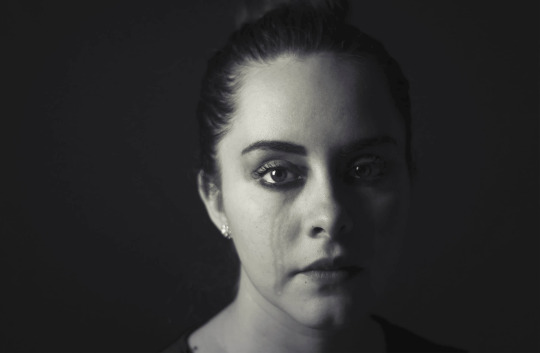
The researchers call it the Tendency for Interpersonal Victimhood (TIV), which they define as “an ongoing feeling that the self is a victim, which is generalized across many kinds of relationships.”
... a consistent and stable trait that involves four dimensions: moral elitism, a lack of empathy, the need for recognition, and rumination.
... those who scored higher on the measure of TIV were more likely to desire revenge against the person who wronged them.
... those high in TIV were more likely to remove money from their opponent when given the chance, despite being told that this decision wouldn’t increase their own winnings. Participants high in TIV also reported experiencing more intense negative emotions and a higher entitlement to immoral behavior.
Okay, so will they try to cancel Psychology now?
29 notes
·
View notes
Photo
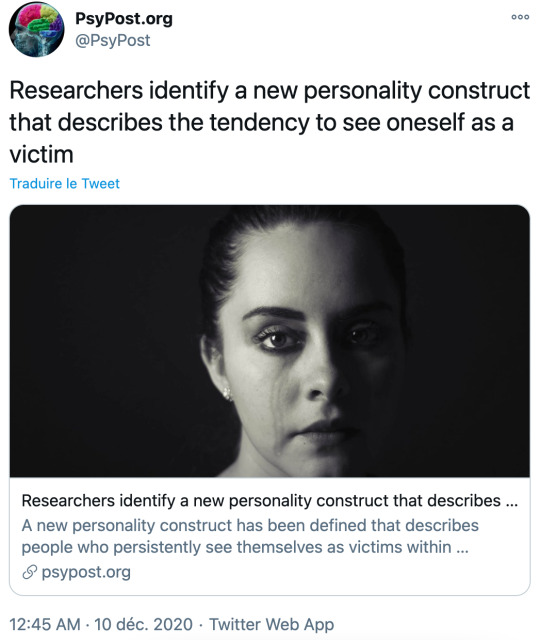
Researchers identify a new personality construct that describes the tendency to see oneself as a victim
(Eric W. Dolan, PsyPost, Dec 03 2020)
“Study authors Rahav Gabay and team describe how the social world is satiated with interpersonal transgressions that are often unpleasant and seemingly unwarranted, such as being interrupted when speaking.
While some people can easily brush off these moments of hurt, others tend to ruminate over them and persistently paint themselves as a victim.
The authors present this feeling of being the victim as a novel personality construct that influences how people make sense of the world around them.
The researchers call it the Tendency for Interpersonal Victimhood (TIV), which they define as “an ongoing feeling that the self is a victim, which is generalized across many kinds of relationships.” (…)
An initial three studies established the TIV as a consistent and stable trait that involves four dimensions: moral elitism, a lack of empathy, the need for recognition, and rumination.
A follow-up study further found that this tendency for victimhood is linked to anxious attachment — an attachment style characterized by feeling insecure in one’s relationships — suggesting that the personality trait may be rooted in early relationships with caregivers. (…)
The researchers suggest that TIV as a construct offers a framework for understanding how a person’s interpretation of social transgressions can inform feelings of victimhood and lead to revenge behaviors.
These insights could inform therapeutic practices for treating such cognitive biases.
The authors suggest that it would be particularly interesting for future studies to explore what happens when people high in TIV are in positions of power.
The researchers wonder whether leaders with this persistent tendency to see themselves as a victim might feel more inclined to behave “in a vindictive way.””
22 notes
·
View notes
Text
Respect Culture
I have worked with many socially excluded and marginalized groups. I have also seen the dark and unpleasant underbelly of a nation encountering the reality of homelessness, addiction, crime and prostitution.. I am not a professional social scientist but these are my ‘layman’s’ conclusions about the culture at the bottom of society.
1. The majority of the chronically street homeless (i.e. those who are homeless for more than a few weeks or months) suffer from severe mental health and/or addictions. In all the cases I have encountered there was some degree of mental ill health and addictive behaviour prior to homelessness though rough sleeping usually worsens these afflictions. A very substantial number of the chronically homeless have had social housing (in some cases multiple tenancies as well as private lets) but these have not be sustainable due to the tenant’s behaviour. Frequently the accommodation is lost due to persistent non payment of rent, anti-social activities or prolonged periods in custody. Family and spousal estrangement is also a significant factor.
2. Drug addiction (in contrast with alcohol addiction) is social. No one is a drug addict on their own without a network of people who encourage and feed the habit. Drug addicts form almost exclusive social groups with other addicts, or addiction is mutually supported within couples. They are often bound together only by the rituals of obtaining and using drugs, exchanging drugs and drug information, and especially the lending of money to each other. It is very difficult for individuals to break free from the social aspect of drug taking. The rehabilitated person often begins with loss, friendless and either treated with suspicion by their former associates or constantly badgered to re-start their habit. Chronic addiction results in alienation from all normative family relationships, very low engagement with social institutions including those designed for leisure and education, and little to no interest in current affairs.
3. Most addicts are also petty occasional dealers within their small circles.. To sustain their habits and due to debt obligations accrued to their own drug suppliers, individuals will become runners to supply drugs for friends; some will seek to earn future ‘credit’ or make a profit on these deals.
4. Where voluntary organisations provide regular food or other useful donations with no strings attached, the addicts will tend to cease to purchase essential items and spend more money on their addictions. Street homelessness is sustained by organisations that claim to want to remove people from the street. Established charities have a very different approach and help is almost never entirely unconditional..
5.. Marginalised groups are most likely to emphasise their wish and need for ‘respect’. These individuals have no job or only occasional casual work. They are often under educated; in many case they failed or were excluded from school; their addictions consumed their early adulthood. They may have no developed skills or work experience, there is substantial emotional retardation as drug habits and the escape from reality they provide disrupts the maturing process of gaining greater responsibility for one’s own life.
In any event prolific offending behaviour to feed their habit has also made it very difficult for them to find employment. They have next to no financial resources except those obtained through welfare benefits, begging and criminal activity. Relative to most of society they lack any well regarded social status or significance, and they know their degradation either consciously or unconsciously.
Many of the men, and some women in this seemingly hopeless position, will take offence at the slightest perceived insult or criticism and the mildest obstruction to their immediate wishes. Any hint of disdain or dislike toward them is often met with exaggerated hostility. An expression of fear or nervousness in response to this hostility is in turn met with behaviour that is designed to denigrate or shame the other person, to ‘bring them down’.
There is an expectation that they will be treated like everyone else even if their behaviour is unreasonable. They do not like any reference being made to any wrong doing, mental health, addiction problems or general situation unless this is volunteered; welfare benefits are described as ‘pay’ and discussed as if they are a right they have ‘earned’. Much of the time, outside of private discussions with those they trust, they reject any personal responsibility for their failures and they are extremely sensitive to anyone ‘judging them’. Most have a deeply ingrained sense of victimhood and corresponding sense of entitlement despite or because of their extreme dependence on the largesse of the state.
They do not accept that respect is something to be ‘earned’. Outwardly they express behaviour that is suggestive of substantial personal pride and even excessive, almost narcissistic self regard. Though they have next to no other belongings and poor diets, the majority will ensure they have clean faces, well cut hair and wear some fashionable clothes and trainers. At first glance many do not appear ‘poor’ by their dress, and not all are shabby. Another expression of pride is through exaggerated claims about their great love for their extended families - often quite at odds with their actual negative and strained relations. Family connections are emphasised, whether or not any strong interpersonal relationship exists.
The negative aspect of this respect culture is they may also go out of their way to cultivate fear in others by verbal and sometimes physical violence and intimidation. This culture also leads to bullying of individuals who are perceived as 'weaker' personalities and especially those who are less physically strong. Many are openly hostile and loudly abusive toward individuals from other ethnic and sexual minorities. There is a very strong tendency to scapegoat minorities for their own problems
Most readily understand their legal rights. They readily expect the police services to come to their aid when they have been faulted though they are involved in considerable criminal activity and will tell you how much they hate the police and how corrupt they are. They are strong believers in contractual obligations.
6. Individuals in their immediate circle who are interested in learning, in study or in bettering themselves in anyway are routinely subjected to derision and rejection, intimidation and bullying.
7. Some will use crude graffiti employing their own names, nicknames and 'tags'. This mabe be a way for these individuals to feel they can psychologically dominate their environment, assert their 'territory' and so artificially give themselves social significance.
Discussion
What is happening here? Here is a group that actively opposes society's standards of 'respect' and the various value hierarchies against which they would ordinarily be judged. Young males from this background are often intensely anti-education, as well as anti-authority in all its forms. They often seem inexplicably and unnecessarily aggressive to anyone with enhanced power or status including 'helping' professionals (at other times they will appear excessively craven to service providers as long as they have an expectation that their immediate needs may be met.)
From occasional but revealing private conversations, I know that marginalised, and badly educated men in particular tend to have rock bottom feelings of self worth, lacking as they do social capital and any prospect of economic standing. They have internalised their poor social status but this has not motivated them to improve themselves. This behaviour is not limited to those with a poor upbringing, if their successful progress into full adult life has been thwarted (most often as a consequence of their own behaviour)
What we are seeing are habitual behaviours with the only instrumental means of expression open to them being employed: their emotions, speech, general physicality and personal presentation. I believe marginalised individuals develop a social mask or persona projecting strength with the appearance of dominance, courage and fortitude in stark contrast to their social reality. This seems to be a psychological survival tactic in the more self aware individuals to avoid torpor and permanent depression. These individuals can seem hostile to anyone or anything that reminds them of their personal failure. . They will frequently engage in forms of posturing and social intimidation.
It is more than probable that their addictions to certain substances meet deep personal needs by obliterating feeling of low self worth and internalised inferiority. The chosen drugs do one of two things: they either relax and soothe or boost feelings of strength and confidence.
Conclusion.
Respect Culture is the pervasive phenomena among marginalised groups, especially young men, where in response to an internalized sense of inferiority, and social rejection, the individual projects a protective facade of social dominance. This in turn is experienced by the rest of the society as hostility and aggression resulting in further marginalisation in a vicious downward spiral.
0 notes
Photo
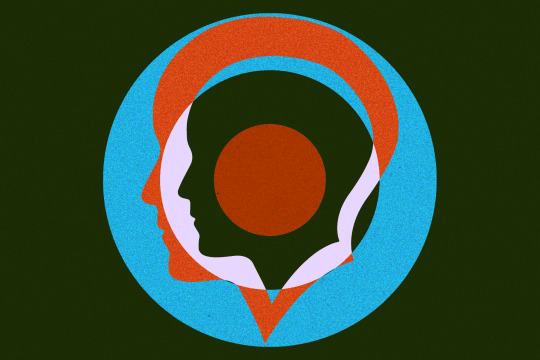
Researchers identify a new personality construct that describes the tendency to see oneself as a victim
A new personality construct has been defined that describes people who persistently see themselves as victims within interpersonal conflicts. The research was published in Personality and Individual Differences.
Study authors Rahav Gabay and team describe how the social world is satiated with interpersonal transgressions that are often unpleasant and seemingly unwarranted, such as being interrupted when speaking. While some people can easily brush off these moments of hurt, others tend to ruminate over them and persistently paint themselves as a victim. The authors present this feeling of being the victim as a novel personality construct that influences how people make sense of the world around them.
The researchers call it the Tendency for Interpersonal Victimhood (TIV), which they define as “an ongoing feeling that the self is a victim, which is generalized across many kinds of relationships.”
Through a series of eight studies among Israeli adults, Gabay and associates sought to test the validity of the construct of TIV and explore the behavioral, cognitive, and emotional consequences of such a personality trait.
An initial three studies established the TIV as a consistent and stable trait that involves four dimensions: moral elitism, a lack of empathy, the need for recognition, and rumination. A follow-up study further found that this tendency for victimhood is linked to anxious attachment — an attachment style characterized by feeling insecure in one’s relationships — suggesting that the personality trait may be rooted in early relationships with caregivers.
Next, two studies offered insight into the cognitive profile of those with TIV. The studies had participants consider scenarios that involved another person treating them unpleasantly — either by having subjects read a vignette describing a partner giving them poor feedback (Study 3) or by having subjects play a game that ended with their opponent taking a larger share of the winnings (Study 4). Interestingly, the two studies found that those who scored higher on the measure of TIV were more likely to desire revenge against the person who wronged them.
In Study 4, this desire for revenge also translated into behavior — those high in TIV were more likely to remove money from their opponent when given the chance, despite being told that this decision wouldn’t increase their own winnings. Participants high in TIV also reported experiencing more intense negative emotions and a higher entitlement to immoral behavior. Mediation analysis offered insight into how this revenge process unfolds. “The higher participants’ TIV, the more they experienced negative emotions and felt entitled to behave immorally. However, only the experience of negative emotions predicted behavioral revenge,” the authors report.
Gabay and colleagues express that their studies indicate that the Tendency for Interpersonal Victimhood is a stable personality trait that is linked to particular behavioral, cognitive, and emotional characteristics. “Deeply rooted in the relations with primary caregivers,” the researchers describe, “this tendency affects how individuals feel, think, and behave in what they perceive as hurtful situations throughout their lives.”
The researchers suggest that TIV as a construct offers a framework for understanding how a person’s interpretation of social transgressions can inform feelings of victimhood and lead to revenge behaviors. These insights could inform therapeutic practices for treating such cognitive biases.
The authors suggest that it would be particularly interesting for future studies to explore what happens when people high in TIV are in positions of power. The researchers wonder whether leaders with this persistent tendency to see themselves as a victim might feel more inclined to behave “in a vindictive way.”
The study, “The Tendency for Interpersonal Victimhood: The Personality Construct and its Consequences”, was authored by Rahav Gabay, Boaz Hameiri, Tammy Rubel-Lifschitz, and Arie Nadler.
0 notes
Photo
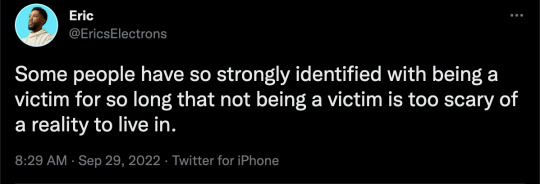
#Eric's Electrons#victimhood#victimhood culture#Tendency for Interpersonal Victimhood#psychology#human psychology#religion is a mental illness
29 notes
·
View notes
Text
0 notes
Quote
They identify a negative personality trait they call TIV or Tendency toward Interpersonal Victimhood. People who score high on a TIV test have an “enduring feeling that the self is a victim in different kinds of interpersonal relationships,” they write.
The study of TIV is built around four pillars. The first pillar is a relentless need for one’s victimhood to be clearly and unequivocally acknowledged by both the offender and the society at large. The second is “moral elitism,” the conviction that the victim has the moral high ground, an “immaculate morality,” while “the other” is inherently immoral. The third pillar is a lack of empathy, especially an inability to see life from another perspective, with the result that the victim feels entitled to act selfishly in response. The fourth pillar is Rumination—a tendency to dwell on the details of an assault on self-esteem.
You only need to spend only a few minutes watching or reading the news, in any country, to hear and see victimhood raging.
Why People Feel Like Victims - Issue 99: Universality - Nautilus
#outrage culture#the shouting class#whiners#playing the victim#false narratives#trends#psychology#purity culture
1 note
·
View note
Text
Self-Victimhood Is a Personality Type, Researchers Find
https://reason.com/2020/12/10/tendency-for-interpersonal-victimhood-trauma-research-study-trigger/
Comments
0 notes
Note
Why are you such a bitch
Tendency for interpersonal victimhood :(
0 notes
Text
Symptoms of Childhood Trauma in Adults
One of the biggest predictors of adult onset mental health disorders is whether someone had experienced trauma in childhood. Children who experience physical or sexual abuse, neglect, sudden loss of a loved one, or domestic abuse can be carry permanent psychological scars from these devastating events or situations. Children simply do not have the coping skills or emotional resilience to overcome certain traumatic circumstances, which becomes apparent in adulthood.
The symptoms of childhood trauma in adults can manifest in a variety of ways, such as a mental health disorder, interpersonal problems, or general instability. Low self-esteem, neediness, trust issues, social problems, passivity, or overly controlling natures are some of the common traits seen in adults who had experienced trauma as children. Often, however, it isn’t until the adult is in therapy that the connection is made between their current issues and their history of childhood trauma.
How Trauma Affects Children
Children who are exposed to trauma, either personally experiencing it or witnessing a traumatic event, may experience profound effects throughout their lifetime. Depending on which developmental stage the trauma occurs, emotional effects can very. This is because of brain development at a given age, which impacts the ability to reason or process the event. Childhood trauma may include:
Sexual abuse
Physical abuse
Domestic abuse
Natural disasters
Serious car accident
Sudden death of a loved one
Serious medical illness or injury
Kidnapping
Experiencing school violence
By the nature of being a child, totally dependent on others, significant stressful events leave the child feeling that their life is threatened or out of control. As a result the brain registers these feelings of fear or abandonment by producing fear-related hormones, such as cortisol, which can become a survival mechanism. This perpetual state of upheaval or fear can result in engrained disorders in emotional, cognitive, and behavioral functioning that will seep into adulthood. If there is a co-occurring attachment disorder the situation is further complicated.
How Childhood Trauma Impacts Adult Mental Health
The symptoms of childhood trauma in adults can manifest in many different ways. Depending on the personality of the individual and which coping mechanisms are utilized, the symptoms can be as diverse as an ultra domineering control freak to passive victimhood.
A consistent thread that runs through adults who experienced childhood trauma is a tendency to compensate for the deep emotional scars in dysfunctional ways. These might include:
Passive-aggression: The suppressing of emotions, especially of anger, is common in adults of childhood trauma. Underlying anger that remains unexpressed can result in an inability to express feelings honestly or authentically, resulting in backhanded forms of aggression or anger toward a significant other, friends, or coworkers.
Victimhood: Having been victimized as children, in the case of childhood neglect or abuse, may result in “stuck” beliefs that once a victim always a victim. This can lead to adult behaviors that are based on negative self-talk and a sense of victimhood that keeps one from taking control over one’s life.
Presenting a False Self: One coping mechanism for those who experience symptoms of childhood trauma in adulthood is to hide one’s true self and replacing it with a false self that they believe is more acceptable. Burying emotions and pretending the trauma never happened is the way they perceive themselves to have value, versus allowing the true self to emerge, which is feared may lead to rejection.
Treatment for Mental Health Disorders Associated With Childhood Trauma
Depression
Depression is common in adults with a history of childhood trauma. Unresolved emotional pain and latent fear can result in a depressive disorder. Treatment for depression involves a combination of psychotherapy and antidepressants, as well as holistic activities that also help process pain.
Anxiety Disorder
Children who were abused or traumatized develop symptoms such as hyper-arousal of emotions, being easily startled, mood swings, and excessive fears, all hallmarks of anxiety disorder. Anxiety is treated with psychotherapy, particularly cognitive behavioral therapy, anti-anxiety medications and/or antidepressants, and relaxation techniques.
PTSD
Post-traumatic stress disorder results from a traumatic event that has not resolved itself. The individual becomes stuck in the memories, flashbacks, or triggers of the event which can significantly impair daily functioning and damage relationships. PTSD can be treated through various exposure therapies, eye movement desensitization and reprocessing (EMDR), and medication.
Addiction
Adults who harbor deep-seated pain from childhood are prone to using substances to help them cope with the resulting issues that arise in adulthood. Drug and alcohol addiction is treated by detoxification, rehabilitation, and various continuing care strategies that further reinforce sobriety.
Residential Treatment for Latent Trauma Disorder
In some cases, individuals seeking help for a mental health condition that resulted from childhood trauma may find outpatient psychological services inadequate for their needs. When outpatient mental health services have not resulted in better functioning or reduction of symptoms, a residential mental health program may offer the appropriate level of care. Residential programs allow for a much more focused and individualized treatment protocol, and having 24-hour support along with the absence of stressor or triggers is beneficial to the adult seeking help.
In a residential mental health setting, the individual will be immersed in a variety of therapeutic activities that work in an integrated fashion. Medications are reviewed and modified if necessary, and assorted experiential activities further augment the traditional therapies being used. With this comprehensive approach to treatment, the adult who has a history of childhood trauma has an enhanced opportunity for healing and personal growth.
The Treatment Specialist Provides Information and Guidance for Trauma Disorders
The Treatment Specialist is a team of mental health professionals who provide free expert information and data regarding mental health and substance use disorders. When experiencing the symptoms of childhood trauma in adults it is often misunderstood as to what has led to the symptoms. The Treatment Specialist can guide you with important information about the common mental health disorders suffered by adults with a history of childhood trauma, as well as treatment options. For free assistance regarding a mental health disorder, please reach out to The Treatment Specialist today at
(866) 644-7911.
The post Symptoms of Childhood Trauma in Adults appeared first on The Treatment Specialist.
Symptoms of Childhood Trauma in Adults published first on https://familycookwareshop.tumblr.com/
0 notes